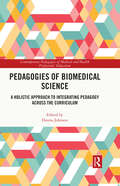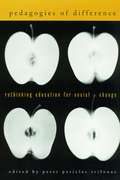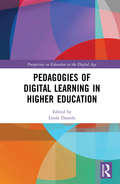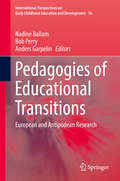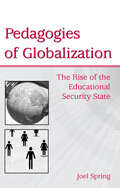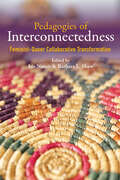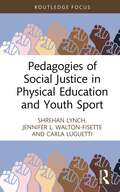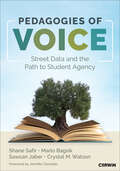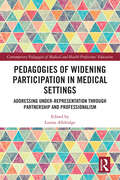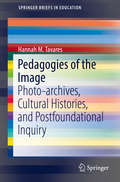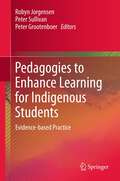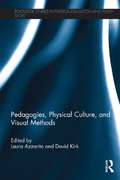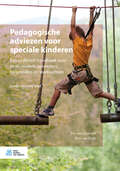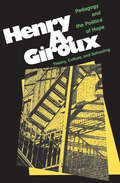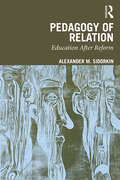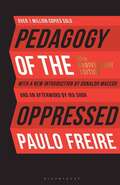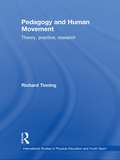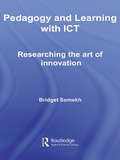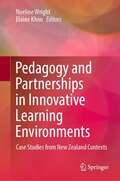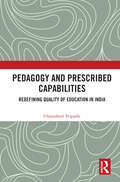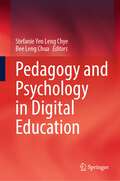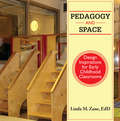- Table View
- List View
Pedagogies of Biomedical Science: A Holistic Approach to Integrating Pedagogy Across the Curriculum (Contemporary Pedagogies of Medical and Health Professions’ Education)
by Donna JohnsonThis book confronts the continually evolving nature of biomedical science education by providing a robust account of learning pedagogies and best practice for scholars and researchers in the field.Rather than considering subdisciplines of biomedical science education separately, the volume takes a holistic approach and considers the complexities of teaching biomedical science as a whole, providing a nuanced overview of how a particular practice fits in such a course overall, as well as providing support for development within the reader’s own subdiscipline. Ultimately, this holistic approach allows for expansive discussion of relevant pedagogical approaches that will directly inform innovations in the contemporary teaching of biomedical science education.Novel in approach and underpinned by the latest in research innovations, this book will appeal to scholars, researchers and postgraduate students in the fields of medical education, higher education, and curriculum studies. Policy makers involved with health education and promotion as well as educational research will also benefit from the volume.
Pedagogies of Difference: Rethinking Education for Social Justice
by Peter Pericles TrifonasPeter Pericles Trifonas has assembled internationally acclaimed theorists and educational practitioners whose essays explore various constructions, representations, and uses of difference in educational contexts. These essays strive to bridge competing discourses of difference--for instance, feminist or anti-racist pedagogical models--to create a more inclusive education that adheres to principles of equity and social justice.
Pedagogies of Digital Learning in Higher Education (Perspectives on Education in the Digital Age)
by Linda DanielaPedagogies of Digital Learning in Higher Education explores topical issues in education and pedagogy related to the learning process in a technology and media-enriched environment. With a range of international contributions, it opens discussions on the development of the educational science sector and strategies for smart pedagogy to promote a synergy between technology and pedagogy to support students in the learning process. This book analyzes the knowledge-building dimension; the potential of technological solutions to provide feedback. It provides practical offerings that will be of use to those whose interests are related to the collection of research results, digital referencing, the use of online learning tools, or the use of virtual reality solutions in historical constructions. In addition, ideas to promote creativity and the use of digital technology in music education, biology, career education, and social work education have also been developed. This book will be of great interest to academics, researchers, and post-graduate students in the fields of higher education, vocational education, and digital learning
Pedagogies of Educational Transitions
by Bob Perry Nadine Ballam Anders GarpelinThis book presents the latest research on educational transitions from a variety of research traditions and practical contexts set in Australia, New Zealand, and several European countries. It examines, critically questions, and reshapes ideas and notions about children's transitions to school. The book is divided into five parts, the first two of which emphasise diversity and inclusion, with Part II focusing solely on the transition to school for children from Indigenous cultures. Part III explores the notion of continuity, which has been widely debated in terms of its role in the transition to school. Part IV explores the transition to school through the notion of 'crossing borders'. The final section of this book, Part V, includes ideas about future directions for work in the area of educational transitions, and presents the notion of transitions as a tool for change to policy, research and practice. The book concludes with a critical synthesis of the research outlined throughout, including recommendations regarding future research related to educational transitions.
Pedagogies of Globalization: The Rise of the Educational Security State (Sociocultural, Political, and Historical Studies in Education)
by Joel SpringIn this ground-breaking book, Joel Spring examines globalization and its worldwide effects on education. A central thesis is that industrial-consumerism is the dominant paradigm in the integration of education and economic planning in modern economic security states.In the twenty-first century, national school systems have similar grades and promotion plans, instructional methods, curriculum organization, and linkages between secondary and higher education. Although there are local variations, the most striking feature is the sameness of educational systems. How did this happen? How was education globalized? Spring explains and analyzes this phenomenon and its consequences for human life and the future improvement of social and economic organizations. Central themes include:*the elements of the educational security state and the industrial-consumer paradigm in relationship to classical forms of education such as Confucianism, Islam, and Christianity, and their concerns with creating a just and ethical society;*the role of the 'other' in the globalization of educational structures as international military and economic rivalries spark competition between educational systems;*the transition from the Confucian village school to Western forms of education as exemplified in the lives of Ho Chi Minh and Mao Zedong;*the effect of the cultural and economic rivalry between the Soviet Union and the United States and its impact on schooling in both countries;*the rise of the educational security state in China, the Soviet Union, and the United States as these countries focus their educational efforts on military and economic development;*the evolution of progressive education as it appeared in revolutionary movements in South America, Cuba, Nicaragua, and El Salvador;*the transition from traditional to Westernized forms of Islamic education against the background of European imperialism, Arab nationalism and wars of liberation, and the uneasy tension between Western educational ideals and Islamic religious values;*socialist education in the Democratic People's Republic of Korea;*current developments in educational security states such as China, Japan, the United States, the new Russia, and the European Union; and*the consequences of English as the global language and the global spread of the industrial-consumer paradigm.Readership for this book includes scholars and students in comparative, international, and multicultural education; educational policy and politics; historical, social, and philosophical foundations of education; and curriculum studies. It is a particularly timely, informative, engaging text for courses in all of these areas.
Pedagogies of Interconnectedness: Feminist-Queer Collaborative Transformation (Transformations: Womanist studies)
by Richard Russo Ariella Rotramel Letizia Guglielmo Sharon R. Wesoky Christine Keating Jeremy Hall María Claudia André M. Gabriela Torres Isis Nusair Andrea N. Baldwin Sara Youngblood Gregory Barbara L. Shaw Kimberly Sanchez Misty De Berry Linh U. Hua K. Melchor Hall Rebecca Dawson Luisa Bieri Meryl Altman Danielle M. DeMuth Ayana K. Weekley Montserrat Pérez-Toribio Charlotte Meehan Emily Fairchild Leen Al-Fatafta Carolyn Beer Jordan Alderman Brayden Milam Andrea PutalaA generation of scholar-teacher-activists have moved beyond collaborating in theory to embodying, engaging in, and sharing how they practice their pedagogy. Isis Nusair and Barbara L. Shaw edit essays that link feminist, queer, anti-racist, decolonial, and disability theory and practice while using intersectional, transnational, and interdisciplinary approaches to explore how the personal remains political. The contributors describe ways of building communities within and beyond academic programs and examine what it means to engage in community-building work and action across institutional boundaries. In Part One, the essayists focus on the centrality of community building and reinterpreting bodies of knowledge with students, staff, faculty, and community members. Part Two looks at bringing transnational approaches to feminist collaborations in ways that challenge the classroom’s central place in knowledge production. Part Three explores organic collaborations in and beyond the classroom. A practical and much-needed resource, Pedagogies of Interconnectedness offers cutting-edge ideas for collaboration in pedagogy, education justice, community-based activities, and liberatory worldmaking. Contributors: Jordyn Alderman, Leen Al-Fatafta, Meryl Altman, María Claudia André, Andrea N. Baldwin, Carolyn Beer, Luisa Bieri, Rebecca Dawson, Misty De Berry, Danielle M. DeMuth, Emily Fairchild, Sara Youngblood Gregory, Letizia Guglielmo, Jeremy Hall, K. Melchor Hall, Linh U. Hua, Christine Keating, Charlotte Meehan, Brayden Milam, Isis Nusair, Montserrat Pérez-Toribio, Andrea Putala, Ariella Rotramel, Ann Russo, Kimberly Sanchez, Barbara L. Shaw, M. Gabriela Torres, Ayana K. Weekley, and Sharon R. Wesoky
Pedagogies of Social Justice in Physical Education and Youth Sport (Routledge Focus on Sport Pedagogy)
by Shrehan Lynch Jennifer L. Walton-Fisette Carla LuguettiThis book offers an overview of contemporary debates in social justice and equity within Physical Education (PE) and Youth Sport (YS). It gives the reader clear direction on how to evaluate their current PE or YS program against current research and provides ideas for content, curriculum development, implementation, and pedagogical impact. The book addresses key contemporary issues including healthism, sexism, racism, classism, heterosexism, ableism and colonialism, and it highlights the importance of positionality and critical awareness on the part of the teacher, coach, or researcher. Presenting an array of case studies, practical examples, and thought-provoking questions, the book discusses equitable pedagogies and how they might be implemented, including in curriculum design and assessment. Concise, and avoiding academic jargon, this is an invaluable guide for pre-service and in-service teachers, teacher educators, coaches, and educators, helping them to ensure that all students and young people are included within the PE and YS settings for which they are responsible.
Pedagogies of Voice: Street Data and the Path to Student Agency
by Shane SafirTransform your classroom into a liberatory space for student voice, belonging, and intellectual development. Too often, traditional educational models silence students’ voices and stifle their genius. Pedagogies of Voice invites educators at all levels to reinvent their schools and classrooms into spaces that celebrate student identity, nurture agency, awaken inquiry, and cultivate deep belonging for every child. Pedagogies of Voice introduces four domains of agency: Identity, Belonging, Inquiry, and Efficacy—foundational pillars for fostering student engagement and growth. Additional features include 8 Pedagogies in Practice: Strategies like microaffirmations, questions over answers, learning design templates, and radical inclusion to spark concrete transformation in your schools and classrooms. Awakenings: Reflective moments designed to foster self-awareness and deepen pedagogical practice. Integrative Case Study: A powerful exploration of Indigenous land-based education and learning by British Columbia leader John Harris. Developed using the Equity Transformation Cycle introduced in the bestselling Street Data: A Next-Generation Model for Equity, Pedagogy, and School Transformation and informed by conversations with educators across North America, this book presents a compelling framework for creating schools that affirm every learner while dismantling systems of oppression. Reimagine your role as an educator and create classrooms that honor every student’s voice.
Pedagogies of Voice: Street Data and the Path to Student Agency
by Shane SafirTransform your classroom into a liberatory space for student voice, belonging, and intellectual development. Too often, traditional educational models silence students’ voices and stifle their genius. Pedagogies of Voice invites educators at all levels to reinvent their schools and classrooms into spaces that celebrate student identity, nurture agency, awaken inquiry, and cultivate deep belonging for every child. Pedagogies of Voice introduces four domains of agency: Identity, Belonging, Inquiry, and Efficacy—foundational pillars for fostering student engagement and growth. Additional features include 8 Pedagogies in Practice: Strategies like microaffirmations, questions over answers, learning design templates, and radical inclusion to spark concrete transformation in your schools and classrooms. Awakenings: Reflective moments designed to foster self-awareness and deepen pedagogical practice. Integrative Case Study: A powerful exploration of Indigenous land-based education and learning by British Columbia leader John Harris. Developed using the Equity Transformation Cycle introduced in the bestselling Street Data: A Next-Generation Model for Equity, Pedagogy, and School Transformation and informed by conversations with educators across North America, this book presents a compelling framework for creating schools that affirm every learner while dismantling systems of oppression. Reimagine your role as an educator and create classrooms that honor every student’s voice.
Pedagogies of Widening Participation in Medical Settings: Addressing Under-representation through Partnership and Professionalism (Contemporary Pedagogies of Medical and Health Professions’ Education)
by Louise AlldridgeAddressing the fact that under-representation has been a concern for medical educators, medical councils, and the government for some time, this book presents the first evidence-based monograph for pedagogies that can be applied to all aspects of widening participation, tackling chronic under-representation in medical settings.Discussing implications that have international ramifications for the field, the chapters showcase a variety of case studies, research, and evaluations that draw on experiences and insights from a wide range of current practitioners, exploring topics such as outreach, access, selection, retention, and progression. From widening participation leads and officers to national representative bodies and students from medical schools nationwide, the book sets out perspectives, guidelines, and research that can be applied throughout the medical student life cycle. Novel in approach and timely in content, this edited collection coincides with the drive to increase social mobility and the proportion of medical students from educationally and socially disadvantaged backgrounds, directly tackling the class system and elitism present in the medical professions.This book will be of great benefit to scholars, researchers, and postgraduate students in the fields of medical education, multicultural education, and higher education, as well as those researching the idea of widening participation in the medical field and diversity in the professions more specifically.
Pedagogies of the Image
by Hannah M. TavaresThis work considers the potential of photographs for orienting in acritical direction the scope, questions and interests of the disciplinaryconventions of the field of educational inquiry. Visual objects may helpilluminate broader socio-historical events and logics that are deeply entwinedwith education yet remain marginal to or "outside" of what constitutes itsdomain of study. In this work photographicimages are treated as resources for re-visioning the founding disciplinaryobjects of educational studies by reorienting its proper objects of study,traditional archives, persistent categories, frames of reference, and acceptedportals of research and inquiry. A theoretic framingshapes the question taken up in this work, "How might an engagement with photo-archives open new horizons inthe study of education from a postfoundationalist, multi-theoretic andcross-disciplinary perspective?" The author constructsa rather unconventional vantage point to explore this question that opens on tothe discursive spaces of three photographs made of three women in the years1897, 1949, and 1966. The photographs are analysed from three theoreticapproaches. First, it is indicated how each photographic image not only marks arelationship to the past, the present, and the future but to the rules andconventions of photographic practices. These particular images give anaccount of what both persists and exceeds the photographic image, and permit torewrite the bodies and lives pictured. Second, the subject matter of eachphotographic image while singular and local bears witness to the complexnetwork of racial, patriarchal and colonial logics and their profoundimbrication with a "technically mediated inscription. " For alltheir singularity the photographs cannot but evoke their relation to the deeplyhistorical character of photography. Finally, the photographs make possible anaccount of broader occurrences, subterranean histories, contexts, anddifferently situated experiences that illuminate, much like the principle ofmontage, a sequence of overlapping events crosscutting with one anotherconsequently throwing open the possibility of responding to and transformingthe histories and archives we are given.
Pedagogies to Enhance Learning for Indigenous Students
by Peter Sullivan Peter Grootenboer Robyn JorgensenThis book describes research undertaken by leading Australian researcher in Indigenous communities. While the chapters are Australian in their focus, the issues that are discussed are similar to those in other countries where there are indigenous people. In most cases, in Australia and internationally, Indigenous learners are not succeeding in school, thus making the transition into work and adulthood quite tenuous in terms of mainstream measures. The importance of being literate and numerate are critical in success in school and life in general, thus making this collection an important contribution to the international literature. The collection of works describes a wide range of projects where the focus has been on improving the literacy and numeracy outcomes for Indigenous students. The chapters take various approaches to improving these outcomes, and have very different foci. These foci include aspects of literacy, numeracy, curriculum leadership, ICTs, whole school planning, policy, linguistics and Indigenous perspectives. Most of the chapters report on large scale projects that have used some innovation in their focus. The book draws together these projects so that a more connected sense of the complexities and diversity of approaches can be gleaned.
Pedagogies, Physical Culture, and Visual Methods (Routledge Studies in Physical Education and Youth Sport)
by David Kirk Laura AzzaritoTo understand and more creatively capture the social world, visual methods have increasingly become used by researchers in the social sciences and education. However, despite the rapid development of visual-based knowledge, and despite the obvious links between human movement and visual forms of understanding, visual research has been scarce in the fields of physical culture and physical education pedagogy. This groundbreaking book is the first to mark a "visual turn" in understanding and researching physical culture and pedagogies, offering innovative, image-based research that reveals key issues in the domains of sport, health, and physical education studies. Integrating visual research into physical culture and pedagogy studies, the book provides the reader with different ways of "seeing", looking at, and critically engaging with physical culture. Since human movement is increasingly created, established, and pedagogized beyond traditional educational sites such as schools, sport clubs, and fitness gyms, the book also explores the notion of visual pedagogy in wider physical culture, helping the reader to understand how visual-based technologies such as television, the internet, and mobile phones are central to people’s engagement with physical culture today. The book demonstrates how the visual creates dynamic pedagogical tools for revealing playful forms of embodiment, and offers the reader a range of visual methods, from researcher-produced photo analysis to participatory-centred visual approaches, that will enhance their own study of physical culture. Pedagogies, Physical Culture and Visual Methods is important reading for all advanced students and researchers with an interest in human movement, physical education, physical culture, sport studies, and research methods in education.
Pedagogische adviezen voor speciale kinderen: Een Praktisch Handboek Voor Professionele Opvoeders, Begeleiders, Leerkrachten
by Ron Van Deth Trix Van LieshoutDit boek is ontstaan vanuit vragen uit het werkveld om concrete, praktische adviezen voor de begeleiding van kinderen en jongeren met extra ondersteuningsbehoeften. Deze adviezen worden hierin uitvoerig besproken. De nadruk ligt op oplossingsgericht werken: mét jongeren zoeken naar wat al wél goed gaat, wat zij nog nodig hebben en wat voor hen goed werkt.Door zijn eenduidige structuur is het boek zowel een naslagwerk als een praktisch handboek. Bij alle probleemgebieden komen het beeld, de oorzaken, behandelingen, prognose en concrete handelingssuggesties aan de orde.Deze geheel herziene derde druk maakt gebruik van het nieuwe DSM-5 classificatiesysteem, waarbij wij ook de nadelen van etiketteren bespreken. Alle hoofdstukken zijn geactualiseerd.Het boek is geschreven voor (aankomend) orthopedagogen, psychologen, leerkrachten, intern begeleiders, (vak)docenten, zorgcoördinatoren, maatschappelijk werkers, kinder- en jeugdartsen en voor opleidingen in Hoger Beroepsonderwijs en Universiteit.Trix van Lieshout was als orthopedagoog en gezondheidszorgpsycholoog ruim 35 jaar werkzaam in het Voortgezet (Speciaal) Onderwijs. Zij schreef eerder Druk, druk, druk. Praktische tips voor de opvoeding van kinderen met ADHD. Momenteel geeft ze lezingen over pedagogisch vakmanschap. Website: www.trixvanlieshout.nlRon van Deth is psycholoog en publicist, verbonden aan het Europees Instituut voor Educatie in Driebergen. Hij was jarenlang docent in verschillende vormen van onderwijs en eindredacteur van PsychoPraktijk. Eerder schreef hij onder andere Psychiatrie: van diagnose tot behandeling en Inleiding in de psychopathologie.
Pedagogy And The Politics Of Hope: Theory, Culture, And Schooling: A Critical Reader (The\edge: Critical Studies In Educational Theory)
by Henry GirouxHenry A. Giroux is one of the most respected and well-known critical education scholars, social critics, and astute observers of popular culture in the modern world. For those who follow his considerably influential work in critical pedagogy and social criticism, this first-ever collection of his classic writings, augmented by a new essay, is a must-have volume that reveals his evolution as a scholar. In it, he takes on three major considerations central to pedagogy and schooling.The first section offers Girouxs most widely read theoretical critiques on the culture of positivism and technocratic rationality. He contends that by emphasizing the logic of science and rationality rather than taking a holistic worldview, these approaches fail to take account of connections among social, political, and historical forces or to consider the importance of such connections for the process of schooling. In the second section, Giroux expands the theoretical framework for conceptualizing and implementing his version of critical pedagogy. His theory of border pedagogy advocates a democratic public philosophy that embraces the notion of difference as part of a common struggle to extend the quality of public life. For Giroux, a student must function as a border-crosser, as a person moving in and out of physical, cultural, and social borders. He uses the popular medium of Hollywood film to show students how they might understand their own position as partly constructed within a dominant Eurocentric tradition and how power and authority relate to the wider society as well as to the classroom.In the last section, Giroux explores a number of contemporary traditions and issues, including modernism, postmodernism, and feminism, and discusses the matter of cultural difference in the classroom. Finally, in an essay written especially for this volume, Giroux analyzes the assault on education and teachers as public intellectuals that began in the Reagan-Bush era and continues today. Henry A. Giroux is one of the most respected and well-known critical education scholars, social critics, and astute observers of popular culture in the modern world. For those who follow his considerably influential work in critical pedagogy and social criticism, this first-ever collection of his classic writings, augmented by a new essay, is a must-have volume that reveals his evolution as a scholar. In it, he takes on three major considerations central to pedagogy and schooling.The first section offers Girouxs most widely read theoretical critiques on the culture of positivism and technocratic rationality. He contends that by emphasizing the logic of science and rationality rather than taking a holistic worldview, these approaches fail to take account of connections among social, political, and historical forces or to consider the importance of such connections for the process of schooling. In the second section, Giroux expands the theoretical framework for conceptualizing and implementing his version of critical pedagogy. His theory of border pedagogy advocates a democratic public philosophy that embraces the notion of difference as part of a common struggle to extend the quality of public life. For Giroux, a student must function as a border-crosser, as a person moving in and out of physical, cultural, and social borders. He uses the popular medium of Hollywood film to show students how they might understand their own position as partly constructed within a dominant Eurocentric tradition and how power and authority relate to the wider society as well as to the classroom.In the last section, Giroux explores a number of contemporary traditions and issues, including modernism, postmodernism, and feminism, and discusses the matter of cultural difference in the classroom. Finally, in an essay written especially for this volume, Giroux analyzes the assault on education and teachers as public intellectuals that began in the Reagan-Bush era and continues today. }
Pedagogy Of English
by Prof. V. Valentina Rupa Prof. K. AslamPedagogy of English is a book prepared under the New syllabus of TNTE University for B.Ed., Course. This book has been written on the basis of our experience of teaching English for the past ten years. So, the main aim of publishing this book is to make the students learn with ease, memorize and pass in the B.Ed., examination. Besides, it also gives an adequate knowledge about the methods of teaching English with a lot of examples. Though there are many books available on teaching English, this one is comprehensive enough to cover up the honours and caters only that much which is really required by the
Pedagogy Of Relation: Education After Reform
by Alexander M. SidorkinThis book defines and galvanizes a new approach to education through refocusing it on human relations. Following on the heels of lackluster accountability- and choice-based reforms, this approach suggests that meaningful educational change depends on recognition that relations between students and teachers and among students are critically important. Stakeholders must create intentional policies and practices that allow the relational side of education to flourish. Focusing on the PK-12 educational system, Pedagogy of Relation provides support for the claim that relations are the basis for successful learning—that education is a profoundly social activity—and to push educational reform in a new direction.
Pedagogy Of Relation: Education After Reform
by Alexander M. SidorkinThis book defines and galvanizes a new approach to education through refocusing it on human relations. Following on the heels of lackluster accountability- and choice-based reforms, this approach suggests that meaningful educational change depends on recognition that relations between students and teachers and among students are critically important. Stakeholders must create intentional policies and practices that allow the relational side of education to flourish. Focusing on the PK-12 educational system, Pedagogy of Relation provides support for the claim that relations are the basis for successful learning—that education is a profoundly social activity—and to push educational reform in a new direction.
Pedagogy Of The Oppressed: 50th Anniversary Edition
by Paulo Freire Donaldo MacedoFirst published in Portuguese in 1968, Pedagogy of the Oppressed was translated and published in English in 1970. Paulo Freire's work has helped to empower countless people throughout the world and has taken on special urgency in the United States and Western Europe, where the creation of a permanent underclass among the underprivileged and minorities in cities and urban centers is ongoing. This 50th anniversary edition includes an updated introduction by Donaldo Macedo, a new afterword by Ira Shor and interviews with Marina Aparicio Barberán, Noam Chomsky, Ramón Flecha, Gustavo Fischman, Ronald David Glass, Valerie Kinloch, Peter Mayo, Peter McLaren and Margo Okazawa-Rey to inspire a new generation of educators, students, and general readers for years to come.
Pedagogy and Human Movement: Theory, Practice, Research (Routledge Studies in Physical Education and Youth Sport)
by Richard TinningAcross the full range of human movement studies and their many sub-disciplines, established institutional practices and forms of pedagogy are used to (re)produce valued knowledge about human movement. Pedagogy and Human Movement explores this pedagogy in detail to reveal its applications and meanings within individual fields. This unique book examines the epistemological assumptions underlying each of these pedagogical systems, and their successes and limitations as ways of (re)producing knowledge related to physical activity, the body, and health. It also considers how the pedagogical discourses and devices employed influence the ways of thinking, practice, dispositions and identities of those who work in the fields of sport, exercise and other human movement fields. With a scope that includes physical education, exercise and sports science, sports sociology and cultural studies, kinesiology, health promotion, human performance and dance, amongst other subjects, Pedagogy and Human Movement is the most comprehensive study of pedagogical cultures in human movement currently available. It is an invaluable resource for anybody with an interest in human movement studies.
Pedagogy and Learning with ICT: Researching the Art of Innovation
by Bridget SomekhBridget Somekh draws on her experience of researching the introduction of ICT into education to look at ICT development over the last twenty years. The book provides a fascinating, in-depth analysis of the nature of learning, ICT pedagogies and the processes of change for teachers, schools and education systems. It covers the key issues relating to the innovation of ICT that have arisen over this period, including: the process of change educational vision for ICT teacher motivation and engagement the phenomenon of ‘fit’ to existing practices systemic constraints policy and evaluation of its implementation students’ motivation and engagement the penetration of ICT into the home online learning and the ‘disembodied’ teacher.
Pedagogy and Partnerships in Innovative Learning Environments: Case Studies from New Zealand Contexts
by Elaine Khoo Noeline WrightThis book examines contexts and possibilities in Aotearoa New Zealand education contexts arising from the international trend for open, flexible, innovative learning environments (ILE), specifically on the pedagogical load. The book responds to questions such as: What does it mean to teach, learn or lead in an innovative learning environment? What happens when teachers move form single cell learning spaces to open, collaborative ones?The chapters provide examples of how teaching in new spaces can be an exciting challenge for teachers and students where they try new ways of teaching and learning, and rethink the purposes of learning and the implications of societal change for learning and what is valued. Examples are drawn from pre-service teachers working in primary and secondary schools and in-service teachers learning to become professionals.The book offers insights into a variety of educational contexts where teachers and students learn and adapt to new learning spaces, and also how different teaching and learning partnerships may be conceived, and flourish. It focuses attention on a range of aspects that teachers, school leaders, and other educators, and researchers may find valuable when they embark on similar initiatives to consider issues pivotal to productive and effective innovative learning environment design, development and implementation.
Pedagogy and Prescribed Capabilities: Redefining Quality of Education in India
by Charusheel TripathiThis book questions the validity and reliability of conventional measures of quality education, such as enrolment ratio, retention rates, pupil–teacher ratio, drop-out rates, learning outcomes of children in foundational literacy and arithmetic and availability of infrastructural facilities, henceforth demanding its re-calibration. It moves away from easily commensurable indicators and actively pursues descriptive indicators of quality, which directly focus on educational processes taking place within the classroom and the factors influencing them.By interacting with the two primary stakeholders, i.e. teachers and students, this book draws a link between what is happening within classrooms vis-à-vis the macro-level governmental policies. The strength of the book lies in its methodological approach to understanding whether students and teachers are able to actualize their capabilities, as pledged to them under official educational programmes. By doing so, the author deems to alter the narrative of how quality of education is visualized, hoping that these revelations have developmental implications for not only India but also the entire international community engaging with the questions of ‘what’ and ‘how’ of quality in school education. In a nutshell, the book endeavours to find out how teachers and students fare in terms of realization of their prescribed capabilities.This book would be useful to students, researchers and teachers working in the fields of education, psychology, development studies, policy studies, social work and sociology. It would also be an invaluable companion to policymakers and professionals, from governmental and non-governmental organizations, working in education and social development.
Pedagogy and Psychology in Digital Education
by Stefanie Yen Leng Chye Bee Leng ChuaThis book brings together latest research which explores the intersection between educational psychology and educational technology. It consolidates contemporary research on the psychological dimension of technology-based learning, and how new learning technologies can impact learners. More specifically, it provides a better understanding of the affordances of technology-based learning, and how they impact the cognitive and affective processes of learners, facilitate new pedagogical approaches, and transform learning environments. It discusses how technology can be used to develop twenty-first-century competencies such as creativity, critical thinking, problem-solving skills, digital literacy, reflection, and lifelong learning, and explores the pitfalls, challenges and dangers therein.
Pedagogy and Space
by Linda ZaneThe intersection of architecture and education is a new and burgeoning area of interest. This book blends architectural design information with theory-based content explaining the foundations of early childhood environments. Colorful photographs of intentionally designed spaces will inspire early childhood professionals and architects alike as they dream, plan, build, and revamp settings. Inspired by the groundbreaking architectural book A Pattern Language: Towns, Buildings, Construction (Oxford University Press, 1977), this resource aims to glean architectural information regarding important design patterns in an environment and utilize them to provide insight into early childhood environments that are both developmentally appropriate and aesthetically pleasing.
